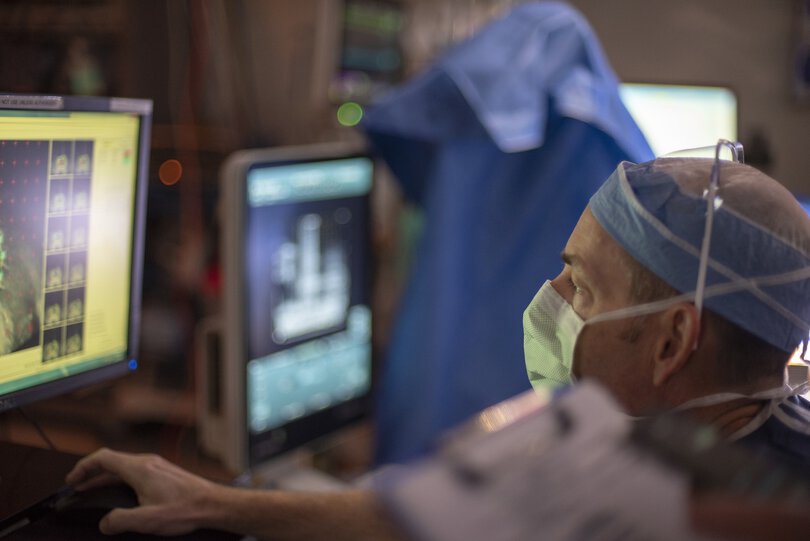Blood & Marrow Transplant
We are a national leader in stem cell and bone marrow transplantation for treating blood cancers and immune system disorders.
Cancer treatments change all the time. Today’s treatments are more precise and more personalized. At MUSC Hollings Cancer Center, we’re committed to providing you with the most up-to-date care that best matches your needs.

At MUSC Hollings Cancer Center, our doctors are developing and writing clinical trials, participating in national research groups, collaborating with colleagues across the country and adopting new technology and techniques.
It means our doctors are ahead of the curve in implementing new treatments and guidelines. Sometimes that means adding something new. Sometimes it means subtracting so that you’re not over-treated. What it always means? That your individual situation is our focus.
Our doctors are ‘right-sizing’ treatment for you, right here in South Carolina, right now.
We are a national leader in stem cell and bone marrow transplantation for treating blood cancers and immune system disorders.
Our experienced cancer surgeons focus on the least invasive and most precise approach possible for each person.
Chemotherapies are drugs used to treat cancer or side effects. It can be used on its own or to make other treatments more successful.
Cancer cells are good at disguising themselves to hide from your immune cells. Immunotherapy helps your immune system to recognize and find cancer.
Personalized treatment based on the specific genetic makeup of your cancer can result in more effective care.
Radiation therapy uses carefully calculated doses of radiation to kill cancer cells and shrink tumors.
Treating cancer takes more than surgical skill or medical knowledge. It takes an understanding of how cancer can affect everything in your and your family’s lives. At MUSC Hollings Cancer Center, we provide holistic care to support you from diagnosis through survivorship.
Other medical needs don’t go away when you have cancer. In fact, it becomes even more important to manage chronic conditions like diabetes or heart disease. It’s also important to have a primary care doctor who understands how cancer and cancer treatments can interact with other conditions and medications.
If you already have a good working relationship with a primary care physician, we encourage you to keep this doctor up-to-date on your cancer treatments. If you don’t have a primary care provider, or if you would like to be seen by a primary care doctor with a cancer focus while you’re in treatment, we have a dedicated family medicine doctor who exclusively attends to patients at MUSC Hollings Cancer Center.
Cancer treatment can be overwhelming. There are a lot of appointments, a lot of people involved and a lot of new terms and ideas to remember. We understand. Our nurse navigators are here to help. Nurse navigators have extensive clinical experience. They are each embedded within a specific cancer team to help you to stay on top of appointments, understand the treatment recommendations and get connected with resources.
Tumor boards are an important feature of the multi-disciplinary care offered at Hollings. They’re a time when specialists from different disciplines – surgeons, medical oncologists, radiation oncologists and more – get together to look at patient cases, discuss options and offer opinions. As a Hollings patient, you’re not cared for by just one doctor. There is an entire team collaborating with your primary oncologist to ensure that you are getting the most appropriate care for your case.
We offer an array of resources to help you through your cancer journey. From smoking cessation programs to genetic counseling, our patient services encompass your physical, mental, spiritual, logistical and financial needs.
Cancer survivors sometimes tell us that cancer doesn’t end when treatment ends.
Cancer can have long-term effects – symptoms that start during treatment and continue – and it can have late effects – symptoms that show up months or years after treatment ended. Symptoms can be physical, like fatigue or neuropathy; emotional, like anxiety or fear of recurrence; or financial.
At Hollings, our survivorship clinics, each focused on a specific type of cancer, are led by dedicated advanced practice providers who work with survivors every day. We collaborate with the MUSC Wellness Center to offer wellness programs focused on survivors of specific types of cancer. And our behavioral specialists focus on working with survivors – both those who have completed treatment and those who are living with metastatic cancer.
Learn more about survivorship services at Hollings